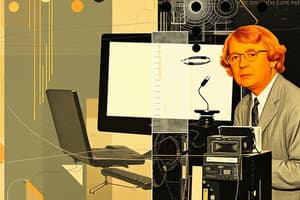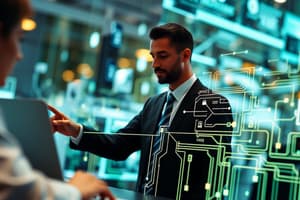Podcast
Questions and Answers
What does ICT stand for?
What does ICT stand for?
Information and Communication Technology
Which of the following is an example of an offline digital tool?
Which of the following is an example of an offline digital tool?
- Skype
- Microsoft Word
- Canary Learning (correct)
- Google Calendar
Educational technology includes only digital tools.
Educational technology includes only digital tools.
False (B)
______ is the ability to find, evaluate, utilize, share and create contents using information technologies and the Internet.
______ is the ability to find, evaluate, utilize, share and create contents using information technologies and the Internet.
Match the following technology tools with their classifications:
Match the following technology tools with their classifications:
What is the definition of Technology?
What is the definition of Technology?
Which of the following tools are examples of Offline Digital Tools? (Select all that apply)
Which of the following tools are examples of Offline Digital Tools? (Select all that apply)
Educational Technology only includes digital tools.
Educational Technology only includes digital tools.
______ Literacy is the ability to find, evaluate, utilize, share, and create contents using information technologies and the Internet.
______ Literacy is the ability to find, evaluate, utilize, share, and create contents using information technologies and the Internet.
Match the following terms with their definitions:
Match the following terms with their definitions:
Flashcards are hidden until you start studying
Study Notes
Understanding ICT
- Technology refers to a mix of process and product used in the application of knowledge, including tools from simple to latest electronic gadgets.
- ICT Literacy is the use of digital technology, communication tools, and/or networks to access, manage, integrate, evaluate, create, and communicate information in a knowledge society.
Educational Technology
- Educational Technology refers to the use of technology in teaching and learning, including both non-digital (flip charts, pictures, models, realias, etc.) and digital (electronic tools; hardware, software, and connections, etc.) tools.
Digital Literacy
- Digital Literacy is the ability to find, evaluate, utilize, share, and create contents using information technologies and the Internet, requiring both cognitive and technical skills.
Digital Learning
- Digital Learning is any type of learning that is accompanied by technology or by instructional practice that makes effective use of technology, including blended or virtual learning, online or offline.
Digital Tools and Apps
- On-line digital tools and apps use an Internet connection to access information, such as Skype.
- Offline digital tools can be used without an internet connection, such as Canary Learning, Pocket, Evertone, ibooks, and KA LITE.
Instructional Technology
- Instructional Technology is the theory and practice of design, development, utilization, management, and evaluation of the processes and resources for learning.
Software
- Software refers to program control instructions and accompanying documentation, stored on disks or tapes when not being used in the computer.
Multimedia
- Multimedia is the sequential or simultaneous use of a variety of media formats in a given presentation or self-study program.
Internet
- The Internet is a massive network of networks, a networking infrastructure that connects millions of computers together globally.
World Wide Web
- The World Wide Web is a graphical environment on computer networks that allows users to access, view, and maintain documentations that can include text, data, sound, and videos.
Web Access
- Web access is the ability of the learner to access the Internet at any point during the lesson to take advantage of available educational resources.
Productivity Tools
- Productivity Tools refer to any type of software associated with computers and related technologies that can be used as tools for personal, professional, or classroom productivity, such as Microsoft Office and Apple works.
Technology Tools
- Technology Tools are instruments used for doing work, such as data/calculation tools, design tools, discussion tools, email tools, and handheld devices.
Other Concepts
- Webquest is an inquiry-oriented lesson format in which most or all information that learners work with comes from the web.
- Blog is an online journal where posted information from both teachers and students are arranged.
- Wiki is an editable website that allows students to collaboratively create and post written work or digital files.
- Flipped classroom utilizes a reverse instructional delivery, where the teacher is required to use the web resources as homework or out-of-class activity as initial instruction of the lesson.
- Podcast is a video or audio multi-media clip about a single topic, typically in the format of a radio talk show.
- Google apps is a cloud-based teaching tool that includes gmail, Google calendar, Google sites, and Google docs.
- Vlog is a video blog where each entry is posted as a video instead of text.
- Facebook is a popular social networking site used by students and adults worldwide to present information on themselves and to the world.
- VOIP (Voice over Internet Protocol) is a category of hardware and software that enables people to use the Internet as a transmission medium for telephone calls.
Understanding ICT
- Technology refers to a mix of process and product used in the application of knowledge, including tools from simple to latest electronic gadgets.
- ICT Literacy is the use of digital technology, communication tools, and/or networks to access, manage, integrate, evaluate, create, and communicate information in a knowledge society.
Educational Technology
- Educational Technology refers to the use of technology in teaching and learning, including both non-digital (flip charts, pictures, models, realias, etc.) and digital (electronic tools; hardware, software, and connections, etc.) tools.
Digital Literacy
- Digital Literacy is the ability to find, evaluate, utilize, share, and create contents using information technologies and the Internet, requiring both cognitive and technical skills.
Digital Learning
- Digital Learning is any type of learning that is accompanied by technology or by instructional practice that makes effective use of technology, including blended or virtual learning, online or offline.
Digital Tools and Apps
- On-line digital tools and apps use an Internet connection to access information, such as Skype.
- Offline digital tools can be used without an internet connection, such as Canary Learning, Pocket, Evertone, ibooks, and KA LITE.
Instructional Technology
- Instructional Technology is the theory and practice of design, development, utilization, management, and evaluation of the processes and resources for learning.
Software
- Software refers to program control instructions and accompanying documentation, stored on disks or tapes when not being used in the computer.
Multimedia
- Multimedia is the sequential or simultaneous use of a variety of media formats in a given presentation or self-study program.
Internet
- The Internet is a massive network of networks, a networking infrastructure that connects millions of computers together globally.
World Wide Web
- The World Wide Web is a graphical environment on computer networks that allows users to access, view, and maintain documentations that can include text, data, sound, and videos.
Web Access
- Web access is the ability of the learner to access the Internet at any point during the lesson to take advantage of available educational resources.
Productivity Tools
- Productivity Tools refer to any type of software associated with computers and related technologies that can be used as tools for personal, professional, or classroom productivity, such as Microsoft Office and Apple works.
Technology Tools
- Technology Tools are instruments used for doing work, such as data/calculation tools, design tools, discussion tools, email tools, and handheld devices.
Other Concepts
- Webquest is an inquiry-oriented lesson format in which most or all information that learners work with comes from the web.
- Blog is an online journal where posted information from both teachers and students are arranged.
- Wiki is an editable website that allows students to collaboratively create and post written work or digital files.
- Flipped classroom utilizes a reverse instructional delivery, where the teacher is required to use the web resources as homework or out-of-class activity as initial instruction of the lesson.
- Podcast is a video or audio multi-media clip about a single topic, typically in the format of a radio talk show.
- Google apps is a cloud-based teaching tool that includes gmail, Google calendar, Google sites, and Google docs.
- Vlog is a video blog where each entry is posted as a video instead of text.
- Facebook is a popular social networking site used by students and adults worldwide to present information on themselves and to the world.
- VOIP (Voice over Internet Protocol) is a category of hardware and software that enables people to use the Internet as a transmission medium for telephone calls.
Studying That Suits You
Use AI to generate personalized quizzes and flashcards to suit your learning preferences.




